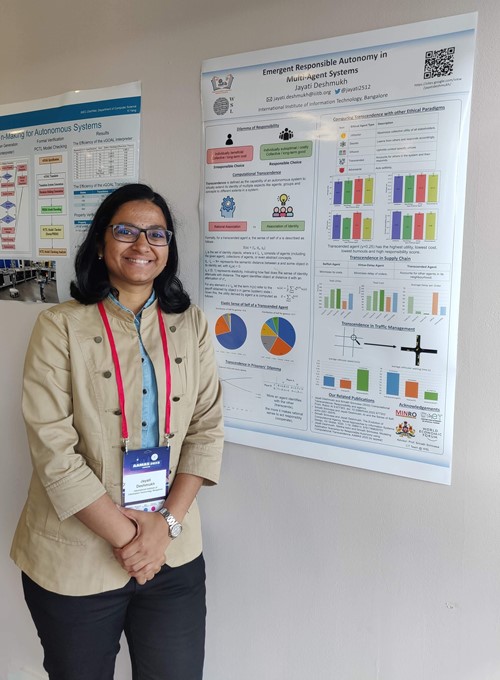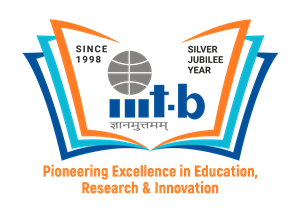
Research is a marathon and not a sprint. It is a long zig-zag path mixed with a lot of ups and downs. It trains us to be an expert in a specific field, to develop the ability to think deeply and to tackle any problem systematically. Jayati Deshmukh’s outlook emphasizes that through our journey, we acquire certification as skilled problem solvers with the power to enact meaningful change. Jayati is a Ph.D. research scholar at the Web Science Lab at IIIT Bangalore. Her research interests are in the area of multi-agent systems, AI ethics, game theory and network science.’
Jayati recently presented two papers at AAMAS 2023 in London, one at the main conference and another at the Doctoral Consortium. Additionally, she showcased her research at the Alan Turing Institute and City University. Furthermore, she engaged in a one-on-one discussion with Prof. Virginia Dignum from Umea University, Sweden, focusing on AI Ethics. Autonomous Agents and Multiagent Systems (AAMAS) is the largest and most influential conference in the area of agents and multiagent systems, bringing together researchers and practitioners in all areas of agent technology and providing an internationally renowned high-profile forum for publishing and finding out about the latest developments in the field.
Jayati reflects on her successful PhD journey with Naviiina and shares valuable tips in a Q&A for others to emulate.
What motivated and inspired you to present your work at the Alan Turing Institute and City University, apart from the AAMAS 2023 conferences?
Prof. Srinath and Prof. Rajagopalan introduced me to their network at the Alan Turing Institute and City, University of London. Through email interactions, I was invited to visit both institutes. During my visit to City, University of London, I had fruitful discussions about my research and gained insights into their ongoing projects. At the Alan Turing Institute, I participated in a full-day workshop focused on Trustworthy Digital Identity, where various speakers presented their work. I also had the opportunity to present my own work to the team. These experiences provided me with valuable opportunities to showcase my research to external experts, receive feedback, and gain in-depth knowledge about the work being conducted in other institutions.
Could you elaborate on the significance of your one-on-one interaction with Prof. Virginia Dignum about AI Ethics? How did that experience influence your research and perspective?
The AAMAS’23 conference featured a Doctoral Consortium track where PhD research scholars could submit their details and a short paper summarizing their thesis work. I participated in this track and my paper was selected. I received valuable feedback from the reviewers. I was fortunate to have Prof. Virginia Dignum, an expert in Responsible AI, as my mentor. We had a comprehensive one-on-one discussion where she provided insightful pointers and suggested future directions for my research. Interacting with Prof. Virginia Dignum and receiving her feedback was truly inspiring and will greatly contribute to the development of my project.
Were there any challenges you faced while conducting your research for the papers you presented at AAMAS 2023?
I remember there was a point when we were working on a specific problem and the experiments were just not working. Despite consistent efforts and regular discussions with my advisor, Prof. Srinath, I encountered continuous challenges as none of the attempted approaches yielded positive results. After investing a significant amount of time and effort into a particular problem, our thinking can become stagnant. However, it becomes challenging to let go of the problem due to the substantial investment we have made in it. Prof. Srinath proposed changing our focus and temporarily setting aside the initial problem. After approximately 18 months, we returned to the original issue and resolved it using a different approach.
Can you discuss any specific moments or situations that tested your perseverance and determination during your journey as a Ph.D. research scholar?
I think the pandemic was the biggest challenge I faced in my research journey so far. It was the point when I had just finished my coursework and was working on formulating my research problem. And the pandemic just disrupted everything in the world along with my momentum of research. For a while, some of us from the lab even worked with the COVID-19 task force which was very satisfying. But then I was losing focus from my research and I remember Prof. Srinath said, “Urgent matters always take priority over important matters. But we should not lose track of what is important while catering to urgent issues.” Then we set up a routine with regular weekly research meetings and gradually I was back on track.
How did you manage to balance your research work and other commitments while preparing for the conferences and presentations?
I’m not a great multi-tasker but I’m learning to do a few important things in parallel. It helps me in two ways– First if one thing is not working out, I can switch to another and then come back to the first one with a fresh perspective. Second, I’m able to work on multiple things rather than doing things one by one. In this way, I’m learning to handle multiple commitments at the same time.
Were there any moments when you felt overwhelmed or doubted your abilities? If so, how did you overcome those feelings?
There is a term for this called the Imposter Syndrome where we feel like imposters, like we don’t belong, that our achievements are by fluke and that others will eventually find out about it. Sometimes I feel like an imposter, at times I even have meta-doubts when I think if I am even good enough to even feel like an imposter and let me tell you that there is no one or easy way to resolve this. Discussing with my advisor, my parents and my friends helps. Their trust in my capabilities strengthens my trust in my ability.
Did you face any specific challenges or dilemmas related to AI Ethics while conducting your research? How did you address them?
Ethics is a very broad area and it wasn’t close to my comfort zone of computer science-related topics. So initially I found it difficult to understand these concepts. Then a few students took a reading elective on this topic with Prof. Srinath and we discussed a variety of concepts related to it in great detail. This helped me to understand the existing work done in the area to some extent and to place our model in context. Eventually, it resulted in a nice paper that is currently under review.
Can you share an instance where you encountered resistance or skepticism regarding your research or ideas? How did you deal with such situations?
Adverse comments in paper reviews are something that every researcher faces countless times over their career. It feels demotivating and almost feels like a personal attack, but once we distance ourselves from our work and be objective, we are able to extract the points from the adverse comments which help us in further improving our work. Science is built on skepticism and it helps in refining the ideas to its crux.
What is your ultimate tip for achieving success in a PhD program?
Choose passion over trends, find a compassionate advisor, embrace diverse projects, collaborate for greater ideas, seek a supportive network, accept failure as progress, embrace vulnerability and stay curious.
We face numerous setbacks throughout our PhD journey. PhD is a training of grit and perseverance along with research. Experiment failures, unexpected results, paper rejections, uncertainty, and desk rejects are common challenges. These obstacles are unavoidable and part of the journey. Although they feel discouraging, taking time to recover and seeking guidance from advisors helps. Pursuing other interests like reading, playing music, or taking walks also aids in calming the mind.


